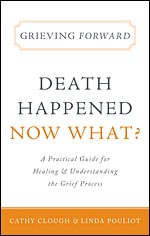
Life Events That Can Trigger Loss
The problem that many of us run into is that we have no idea that there are many different life events that can trigger loss. Me included until I learned more. The reality is that the death of a loved one is not the only type of loss that we can experience during our lifetime. Which means that we can experience a loss and also be experiencing the normal related experience of grieving and not even realize that we have in fact experienced a loss and that we are in fact grieving.
For example, we can’t figure out why we are feeling angry, sad, lonely, anxious, depressed, disconnected… Or we just can’t put our finger on what’s wrong. Because the connection between our confusing and conflicting, and sometimes very painful, internal experience and a recent or long-ago loss is not even on our radar. And believe it or not this disconnect is more common than one might think.
Potential Problem
Unfortunately, when we don’t know what’s going on. When we don’t realize that what we are dealing with is loss and the normal related experience of grief. Or when we are unaware that grief is the normal reaction to loss. What Is Grief We can easily and unintentionally end up emotionally, mentally, and physically stuck in emotional and mental muck. Because we are living in a state of unresolved loss and grief. And this is not the place to set up camp. Because unresolved loss and grief can contaminate the relationship that we have with our self and the relationships that we have with others. And stuck in the muck is not how healing happens. Healing happens as we work through the hand that we have been delt.
“By the way, grieving doesn’t have to mean that you fall apart and retreat from daily life. You can grieve internally and quietly as you turn over the events of your life and think about what’s been lost. You may never achieve closure around ambiguous loss, but once you accept it as real loss, you open yourself to finding meaning in your sadness. (Boss 2021). Your grief is an affirmation of your ability to love and your sadness shows how important relationships are to you.” -Lindsey C. Gibson, PsyD Her Book: Disentangling from Emotionally Immature People
Note
What is a significant or life changing loss for one person may not be for another person. And this is true even when we experience the death of the same loved one as other family members and friends. This also holds true when we experience a similar type of loss as someone else. Which means that the intensity of pain and the emotional upheaval and grief that is experienced after a loss varies from person to person and from loss to loss. And dealing with loss and grief differently is one of the reasons why grieving family members and friends drive each other nuts!
Additionally, as you look over the list keep in mind that even though it’s a long list. It’s really a short list. Because the reality is the list of life events that can trigger loss is endless. Of interest too is that this list also serves as the list of life events that cause grief and stress. Let’s take a look.
The List
- Death of your spouse
- Death of your life partner
- Death of your betrothed
- Death of your child
- Death of your sibling
- Death of a parent
- Death of a stepparent
- Death of a family member
- Death of a close friend
- Death of former spouse/partner
- Death of a co-worker
- Death of your pet
- Death of your business
- Your divorce
- Your parents’ divorce
- Your child’s divorce
- Parent remarrying
- Marriage of child
- Your marriage or a remarriage
- Immature Parent(s) Sometimes we don’t get what we need… Adult Children of Emotionally Immature Parents by Lindsay C. Gibson, PsyD
- Loss of employment
- Change in work responsibilities
- Job relocation
- Retirement
- Negative change in your health
- Negative change in a loved one’s health
- Loved one in Hospice
- Legal issues
- Incarcerated
- Negative/positive change in financial state
- Foreclosure
- Empty nest
- Adult child moving back home
- Rejection by in-laws
- Selling your home
- Abandoned by parents/family
- Your placement in Foster Care
- Your parents Parental Rights terminated
- Your child placed in Foster Care
- Your parental rights terminated
- Your Foster Child returned to biological parent(s)
- Your Foster Child adopted into a family other than yours
- Placing your child for adoption
- Your grandchild placed for adoption
- Closed adoption
- Open adoption
- Disabled child—Loss of the dream(s) you had for your child
- Changing churches
- Changing schools
- Moving to a different state/country/home
- Abortion—Forbidden Loss/Grief due to politics/religious/family belief system.
- Politics—Your person lost, or a bill that you supported did not pass…
- Suicide—Family member/friend
- Medical personnel grieving the loss of a patient(s).
- First responder grieving the loss of an accident victim(s).
- Students grieving the loss of a fellow student(s).
- Wanted change – For example, you’ve landed your dream job but now have to sell your home and move to another state.
- Loss of trust
- Loss of safety
- Loss of what could have been
- Loss of normality
- Lost Connection with others
- Loss of faith
- Government Lock Down/Loss of freedom/vaccine mandates/business closure…
- Pastor retiring/relocating/dying
- War/Living in a war zone
- Genocide/Living in war zone
- Military/Combat/Gold Star Family
Secondary Loss
This list also serves as the list of Life Events That Can Cause Grief. And stress. Because grief is the normal reaction to loss. And stress rides shotgun with loss and grief. Additionally, this list serves as the List of Secondary Loss. Secondary loss is the direct result of the initial loss and is many times referred to as secondary grief. For example, after the death of a spouse or parent the family home may need to be sold for financial reasons. Selling the house becomes a secondary loss to the death of the loved one and may also need to be acknowledged and grieved. My Blog: Secondary Loss Can Catch Us Off Guard
Healing Action Step
Make a list of all of the types of loss that you have had to deal with in your life. Sometimes it’s helpful to make a timeline. The purpose of this exercise is to get you thinking about how much loss that you have already experienced, navigated, and how much healing that you have already accomplished in your lifetime. And possibly to identify a few areas of loss that need your attention for healing.
References
Gibson, L.C. 2023. Disentangling From Emotionally Immature People. Oakland CA: New Harbinger Publications, Inc. (200)
Pouliot, L. 2024 Life Events That Can Trigger Loss is based on 25 years facilitating grief support groups. My time as a foster parent. Adoptive parent.

